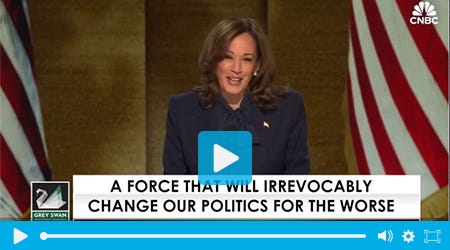SOUND THE ALARM: HARRIS AGENDA THREATENS MARKET DISRUPTION
As the presidential election nears, conservative economists and market analysts are expressing serious concerns about the effects Kamala Harris's progressive policy platform could have on the U.S. economy and financial markets if implemented.
A major focus of the criticism is Harris's tax plan, which calls for raising corporate tax rates back to 28% after they were cut to 21% under the 2017 Tax Cuts and Jobs Act. Conservative think tanks like the Tax Foundation have argued that reversing those corporate tax cuts could make the U.S. less competitive globally and dampen business investment and economic growth.
Harris has also proposed higher taxes on capital gains and wealthy households, which Republicans warn could stifle investment, entrepreneurship and capital formation needed for a robust economic recovery coming out of the pandemic.
Sponsor
Get out of cash before the Fed's next meeting [Full Story >>]
On the spending side, Harris backs large expansions of government investment in areas like clean energy, infrastructure, housing and childcare. While Democrats promote this as critical to future growth, fiscal hawks counter that the multi-trillion dollar price tag can't truly be paid for through tax hikes alone and would inevitably increase federal debt levels significantly.
This prospect of ballooning debt is particularly worrying to deficit hawks who fear it could trigger higher interest rates, crowd out private investment, and stoke inflation that the Federal Reserve may have difficultly containing. Some conservative economists point to the parallels of loose fiscal and tighter monetary policy mixes that plagued the economy with persistently high inflation in the 1970s.
Harris's bold climate agenda of swiftly transitioning away from fossil fuels toward renewable energy is also viewed with trepidation by many on the right who are concerned about its economic fallout on the U.S. energy industry, potential energy price shocks, and national security risks of greater foreign energy dependence.
From a regulatory perspective, Republicans are highly critical of the Democratic party's increasingly confrontational stance toward alleged corporate monopolies and anti-competitive behavior across big tech, healthcare, banking and other major industries. Fears abound that unchecked regulatory overreach under a Harris administration, guided by progressive antitrust enforcement, could erect hurdles to innovation, entrepreneurship and shareholder value creation.
Of course, these concerns are not universally shared across the business community. Some executives have voiced support for increased spending on initiatives they see as pro-growth like infrastructure, childcare and green energy over the long-term. And many moderate Democratic-leaning economists on Wall Street push back against doomsday narratives, contending that realistic policy compromises would temper extreme impacts.
But prominent conservative voices in economics and finance clearly see the need to brace for potentially significant market volatility, prolonged stock sell-offs, and investment/job losses in certain sectors if Harris's progressive policy vision were to go into full effect over the next four years. Options for defending portfolios and capital preservation are being widely discussed and debated across the ideological spectrum as election uncertainty looms.
YOU NEED TO WATCH THIS NOW
"Exposed: The Plot to Destroy America”
We’ve just lived through the fastest, most modern coup in American history.
One minute, Joe Biden was your president.
The next, he was gone—pushed out by the same people who are now preparing to place Kamala Harris in power.
This was no accident. It’s all part of a well-orchestrated plan, and Kamala’s next move is even more dangerous.
The same team that predicted Biden’s dropout now warns of a secret plot where a Kamala presidency will destroy America as we know it.
But you don’t have to be powerless. We’ve created a 2024 Election Wealth Survival Guide to help you protect what’s yours in the face of what’s coming.
Act now—before it’s too late.





